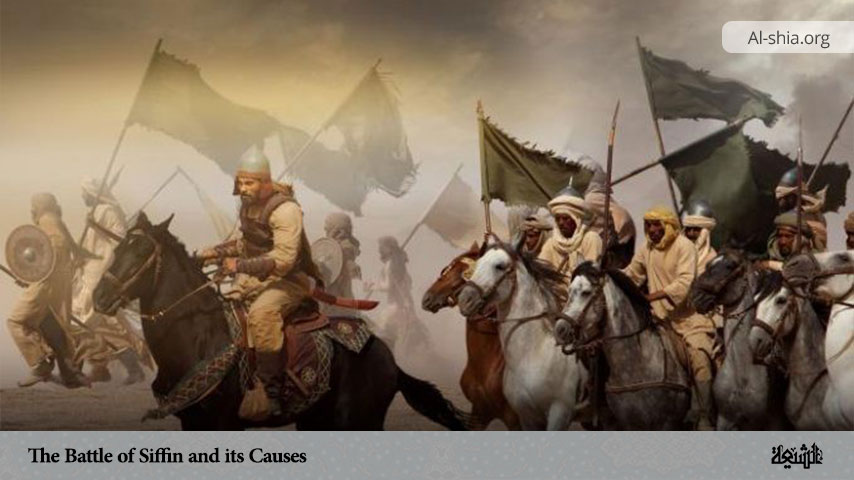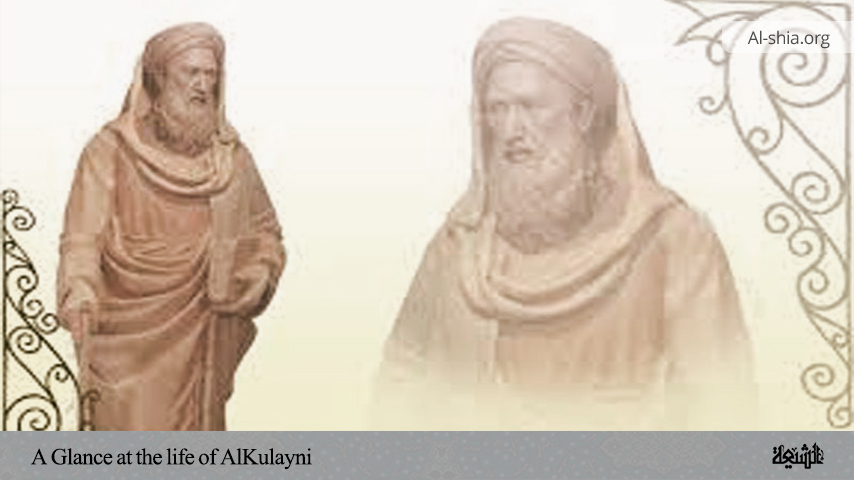The Battle of Siffin was fought between the Commander of the Faithful, Ali ibn Abi Talib (peace be upon him) and Mu’awiya ibn Abi Sufyan. The battle was named after its location Siffin, a ruined Byzantine-era village at the right bank of the Euphrates in the vicinity of Raqqa in present-day Syria.
It is pertinent to say that after the nomination of Ali ibn Abi Talib (PBUH) based on the popular support of the Muslims as the leader of the Muslim community in 656 CE, he was faced with numerous oppositions from some groups of people, who had personal grudges against him. For instance, Aisha, a wife of Prophet Muhammad, Talha and Zubair had some grudges against Ali and when Aisha heard about the accession of Ali to the position of the caliphate in Medina, she stationed herself in Mecca and publicly blamed the assassination of Uthman on him and engaged in propaganda against the caliph.
Thus, in the Battle of the Camel in 656 CE, the rebel group was a coalition of disparate interests, and its members were held together only by their common hatred of Ali. It lacked singleness of purpose. Aisha for instance, was fighting to elevate her nephew, Abdullah ibn Zubayr, to the throne of the caliphate, while Talha and Zubayr – who thus broke their earlier oaths of allegiance to Ali- whose objectives were different, as the latter believed that the caliphate was their right after Uthman. Thus, their coalition was far from being the one-for-all and all-for-one triumvirate that their supporters might have liked it to be.
This time around, however, Ali was confronted by an enemy who was far more subtle, devious, insidious and dangerous than the “triumvirate” of Aisha, Talha and Zubayr had ever been. In fact, he was so subtle that in comparison, Talha and Zubayr were little more than political backwoodsmen.
The Cause of the Battle
Origins of the Battle of Siffin could be traced back to the period when Imam Ali (peace be upon him) took the position of the caliphate and decided to dismiss those governors appointed by Caliph Uthman. Thus, Imam deposed Mu’awiya ibn Abi Sufyan from the governorship of Syria and appointed ‘Abd Allah ibn ‘Abbas in his place. Imam Ali (peace be upon him) wrote a letter to Mu’awiya, asking him to come to Medina together with the noblemen of Syria. In one of his letters sent through Jarir ibn Abd-Allah al-Bajali to Mu’awiya, Imam Ali (peace be upon him) wrote:
“The people who pledged allegiance to Abu Bakr, Umar, and Uthman also pledged allegiance to me. The one who was present could not choose another person, and the absent one could not but accept those who were present. What is the council of the Emigrants and the Ansar, if they choose a man to be the Imam, which Allah is pleased with it, and if someone blames them or creates a heresy, they should return him to the community from which he left, and if he refuses, he would fight him? O Mu’awiya! I swear by my life, if you look with wisdom and look at the air from your head, you will see that I hated the splitting of Uthman’s blood more than any other person, and you know that I was aloof, except that you accused me and covered up what is obvious to you. Goodbye.”
Mu’awiya did not respond to the letter but kept Jarir in Damascus for too long under various pretexts and secretly prepared the Syrian people for the battle. Thereafter, Imam Ali wrote Jarir again: “Whenever my letter reaches you, force Mu’awiya to act accordingly. Make him choose between these two; either battle or reconciliation. If he accepts battle, do not accept to stay with him, and if he accepts reconciliation, take an oath of allegiance from him.”
Finally, Jarir returned to the Imam unsuccessfully and Ashtar said: “It would have been better if you had sent me.” Jarir said: “If he had sent you, they would have killed you on the pretext that you are one of the Uthman’s killers.”
Mobilization of the Army
After the Battle of the Camel, Imam Ali (peace be upon him) tried to persuade Mu’awiya ibn Abi Sufyan to pay an oath of allegiance to him, as done by others. However, when his Eminence realized that Mu’awiya was not ready to welcome his advice and that the noblemen of Kufa support the decision to go to war with Syria, he invited people to the battle in a public sermon. Imam Ali (peace be upon him) wrote a letter to Abdullah ibn Abbas to prepare the people of Basra to attend the battle; many people from Basra went to Kufa together with Abdullah ibn Abbas.
On the contrary, Mu’awiya also wrote to Amr ibn al-As to join him in Damascus, possibly to draw on his political and military expertise, or perhaps he hoped that Amr would bring neighbouring Egypt under his rule. In the spring of 657 CE, Mu’awiya left Damascus with his army to carry the war into Iraq. He crossed the boundary and halted at a village called Siffin – on the bank of the river Euphrates. His first act was to occupy the waterfront.
The Beginning of the Battle
Both armies settled in a place popularly known as “Qanāsrin” near Siffin. Where the armies had stationed near the Euphrates, there was just a single place where water could be found. Mu’awiya was stationed there and the Imam (peace be upon him) ordered his troops as follows: “Do not fight them unless they initiate the fighting. You are on the right and to leave them till they begin fighting will be another proof from your side against them. If, by the will of Allah, the enemy is defeated, then do not kill the runner away, do not strike a helpless person, and do not finish off the wounded. Do not inflict pain on women even though they may attack your honour with filthy words and abuse your officers, because they are weak in character, mind and intelligence. We have been ordered to desist from them although they may be unbelievers. Even in the pre-Islamic (al-jahiliyyah) period if a man struck a woman with a stone or a stick he was rebuked along with his offspring after him.”
Mu’awiya ordered not to let Ali’s army take water. The Imam (peace be upon him) therefore sent him a message: “We have not come here to fight over water.” Amr ibn ‘As also advised Mu’awiya not to prevent them from taking water, but he refused. It thereafter led to a conflict and Ali’s army drove Mu’awiya’s troops away and stationed near the water, the Imam directed his troop thus: “Don’t stop the Syrians from taking water.”
In addition, his Eminence made this speech after his troops drove the Syrian troops out of the water source: “I saw you in the ranks from the place of being cut off and returning. The unknown, lowly desert dwellers from among the Syrian people were driving you back, while you are the chosen Arabs and the souls of the seeds of honour and the forerunner in nobility, high rank and vision. Finally, my heart burned when I saw that you drove them away, just as they had driven you from their place, as they were driven from your place. They were killed with their arrows and spears.”
Imam Ali (peace be upon him) sent Malik al-Ashtar to the army of Mu’awiya ibn Abi Sufyan for talks before the war, emphasizing that Imam Ali’s army should not start the war. When Malik al-Ashtar departed the camps, the army of Syria had already started the battle. However, after this attack, the army of Syria retreated. Once again, the confrontation between the two armies began. Sometimes in the form of an unorganized battle and sometimes in the form of a fight between the warriors. When the month of Dhul-Hijjah of the year 36 Hijra ended and the month of Muharram began, the two armies stopped fighting and rested in the hope of achieving peace that month.
On the first day of Safar, there was a violent war between the two armies. Every day, one of Imam Ali’s commanders undertook the leadership of the frontline. On the first day Malik al-Ashtar, on the second day Hashim b. ‘Utba, on the third day ‘Ammar b. Yasir, on the fourth day Muhammad b. al-Hanafiyya, and on the fifth day ‘Abd Allah b. ‘Abbas led the frontline.
At a point when the army of Mu’awiya was about to be defeated because of the attacks made by Malik al-Ashtar, Mu’awiya asked ‘Amr ibn al-‘As for advice. By the suggestion of ‘Amr ibn al-‘As and the order of Mu’awiya, the people of Syria put copies of the Qur’an on their spears, shouting: “O’ people of Iraq! Let God be the arbiter between us”. This trick worked as a group of Ali’s armies who were among the Qur’anic reciters went to Ali and said that it is not proper for us to fight with these people, we must accept what they said. Whatever Ali said that it was a trick they adopted and ordered his army to continue the battle, but most people in his army wanted to accept the arbitration. Thus Imam Ali (peace be upon him) had no option except to accept the arbitration.
The Aftermath of the Battle
Meanwhile, Imam Ali (peace be upon him) proposed to Abdullah ibn Abbas or Malik al-Ashtar as his arbiter, but some people did not accept his suggestions and imposed Abu Musa al-Ash’ari instead. On the other hand, Mu’awiya nominated ‘Amr ibn al-‘As as their representative for arbitration.
The two arbitrators decided to dismiss Ali ibn Abi Talib and Mu’awiya from power and elected a different person as the Caliph. ‘Amr ibn al-‘As, therefore, asked Abu Musa to announce the result of the arbitration first. Consequently, Abu Musa al-Ash’ari announced the removal of Imam Ali from power, but when it came to ‘Amr ibn al-‘As, instead of announcing the removal of Mu’awiya from power, he confirmed the dismissal of Imam Ali as announced by Abu Musa, and appointed Mu’awiya as the Caliph of the Muslim community. After this, there was a quarrel between these two arbiters and they cursed each other.






